Positive Improvements on the Planet
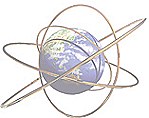 Peace
Is on the Rise
Peace
Is on the Rise
Around the World
By Florida News Group (Originally in English)
On December 20, Golden Year 2 (2005), the United Nations (UN) officially established a Peacebuilding Commission after playing an instrumental part in the high number of peace settlements achieved throughout the world over the last decade. This new Commission will help ensure that these agreements are maintained into the future, long after the international media and the general public have turned their attention elsewhere.[1]
According to the Human Security Report, Golden Year 3 (2006), the UN has played a major role in reducing warfare dramatically during the last decade. Many scholars are now predicting the end of war on Earth. This may sound surprising, given the increase in news coverage of international events. However, from a long-term historical viewpoint, the world has entered a period of unprecedented peace and prosperity.[2]
Over the past 15 years, the number of ongoing wars in the world has decreased by more than 50%. Wars between developed countries have essentially ceased, and global military spending per capita has plummeted. Moreover, peace is becoming a principal objective of many governments. Throughout the world, 27 nations have eliminated their military forces altogether. Capital punishment has now been banned in over 100 countries, and this number is increasing every year. The number of nations that persecute ethnic groups has declined by half over the past 50 years, while the number of democracies has jumped 50% since 1990. And while democracies almost never wage war with each other, even China, a large non-democracy, has made a commitment to peaceful development without large military expenditures.
 Africa
Africa
 |
Liberian President Ellen Johnson-Sirleaf |
On May 5, Golden Year 3 (2006), a chief Sudanese rebel leader signed a peace treaty with the government of the Sudan, marking the end of a 3-year war in the Darfur region of the Sudan.
Darfur, a region roughly the size of France, erupted in civil war in early 2003. The fighting has left at least 180,000 people dead and 2.4 million homeless.
A period of intense talks preceded the signing of the peace agreement, and several deadlines came and went. It was in fact unknown until the signing ceremony on May 5 whether the rebel leader would sign. Meanwhile, there was a serious risk that the war could spill over into a civil war in neighboring Chad and ignite Middle Eastern separatist groups. It was only after a week of intense pressure from African, American and European diplomats that the rebel leader agreed to sign for peace.
This agreement also marks a major turning point in the history of East Africa, as the origins of war in the Darfur region stretch back to the 13th Century when nomadic tribes raising cows, goats, and sheep for meat moved into the area that was already inhabited by farmers. Fighting ensued and has continued between tribes and local farmers since that time. Now there is at last real hope for rebel leaders to integrate into the Sudanese government and for reconstruction of Darfur to begin with aid from the international community.
A similar peace treaty was signed in May, Golden Year 2 (2005), in Burundi, ending a long civil war in that country. Both the Burundi and Sudan treaties were achieved largely through the involvement of the African Union (AU), which was established in 2002 and is modeled after the EU. Eventually, the AU hopes to establish a common African currency, military force, and other institutions to sustain peace throughout Africa.
In November 2005, a truly marvelous event occurred in Liberia, in which Ellen Johnson-Sirleaf became the first woman president in Africa. The election’s outcome was even more remarkable because Liberia had just emerged from a dictatorship and civil war. Despite all expectations, Johnson-Sirleaf, a former UN and World Bank official who is highly respected by the international community, defeated a popular male candidate in an election for which many Liberians stood all day in the heat to vote. Of further significance is the fact that the process itself was peaceful and held none of the violence or corruption that has been a hallmark of Liberian elections in the past. This election was therefore hailed as a sign of true political progress in Africa.
 Europe
Europe
After centuries of conflict that culminated in two World Wars, Europe has now enjoyed a period of unbroken peace and has established institutions to help ensure permanent peace for future generations. One such entity is the European Union (EU), which began as a trade alliance in the 1950s and evolved into a symphony of separate but interdependent nations, sharing common ideals and open borders. The EU is the primary supporter of the UN and pays for nearly half its budget.
The EU has provided inspiration not only as an exemplary organization for other groups like the African Union, it has also served to motivate countries in turning towards peace. For instance, in the early 1970s, Greece, Portugal and Spain were all ruled by militaristic dictatorships, but all became peaceful democracies in order to join the EU. The same is now occurring in Turkey, which has abolished the death penalty, improved human rights and begun reforming its government in order to gain admittance to the EU.
 The
Middle East
The
Middle East
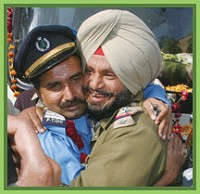 |
An Indian police officer (right) greets a Pakistani bus driver at the India-Pakistan border |
In December, Golden Year 2 (2005), the people of Iraq participated in their first popular election. International observers were amazed by the high turnout (70%) as well as the peaceful and orderly way the elections were conducted. Meanwhile, in the US, political scientists have been astonished to discover that the majority of Americans turned completely against the war in 2005 after only 1,500 US deaths.
Research indicates that people have become more sensitive to violence, far more so than during previous conflicts such as the Vietnam War. People have also become aware of other negative consequences of war such as Post Traumatic Stress Disorder (PTSD), which were not even discussed in the past. Researchers have concluded that people are developing a fundamental aversion to warfare.[3] There are other signs of peace throughout the Middle East. Muslim rebels in Yemen and Algeria have recently abandoned the wars that previously lasted for decades. In Israel, which is at the center of one of the most complicated regional conflicts in the world, the Prime Minister in August 2005 voluntarily withdrew from the Gaza Strip, a territory it has occupied since 1967. This was the latest in a series of remarkable peace offers Israel has made towards Palestinians in recent years.
In February, Golden Year 3 (2006) , US technicians flew to Libya to help the country begin destroying its chemical weapons. Once a major enemy of the US, Libya began denouncing nuclear, biological and chemical weapons in 2003 and more recently invited foreign specialists to come help destroy its remaining stockpiles.
Pakistan-India relations, which nearly collapsed in warfare in 2002, are at an all-time high. Both countries have new heads of state who are committed to peace. A number of cross-border bus and train routes have recently opened and on May 3, 2006, the Prime Minister of India, Manmohan Singh, inaugurated a new bus route between India and Pakistan. He also offered the hope of a comprehensive peace treaty between the nations.
Asia
In 2003, China announced a “peaceful rise” policy, which consists of developing relations with other countries through diplomacy rather than war. The Chinese government has followed through by resolving several border disputes and signing many positive treaties and trade agreements with other nations. Even as China’s economy continues to grow rapidly, it has avoided antagonizing others by emphasizing humility and respect for other nations. This approach is in contrast to a more aggressive militaristic stance taken in the past. The result is something unprecedented in history—a major world power emerging peacefully, without a large military buildup. The “peaceful rise” policy ultimately has had the effect of elevating the tone of foreign policy discussion around the world.
On May 3, Golden Year 3 (2006), the Nepalese government declared a ceasefire and began peace talks with Maoist rebels, ending a 10-year civil war. In Indonesia, a similar peace treaty ending a decade-long civil war was signed in Finland in August, Golden Year 2 (2005).
This coming June 2006, the former President of South Korea, Kim Dae-jung, is scheduled to travel to North Korea to meet with President Kim Jong-il. The South Korean President made a similarly historic trip in 2000, which opened up relations between the two Koreas for the first time in half a century, earning Kim Dae-jung the 2000 Nobel Peace Prize. Since then, South Korea has pursued a “Sunshine Policy” of offering aid to North Korea without seeking to overthrow the government.
Former President Kim Dae-jung’s liberal policies have brought enormous pressure from foreign military leaders, but he has gained the trust of people in both South and North Korea for his well-reasoned, sincere and serene approach. One result is that thousands of families have been able to cross the most heavily guarded border in the world to reunite with their families for the first time in many years. Kim Dae-jung’s next goal is to travel to the June meeting by train along a route that has never before been available. So, just as the borders are relaxing between countries like India and Pakistan, the gulf that previously divided North and South Korea is gradually being connected by a bridge of trust.
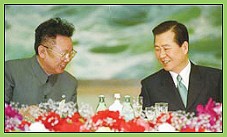 |
The Presidents of North and South Korea in 2000 |
Kim Dae-jung |
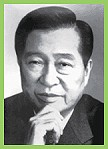 |
 Cambodia
Cambodia
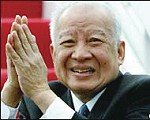 |
The King of Cambodia |
One of the most remarkable stories of peace in Asia has occurred in the nation of Cambodia. In the 1970s, millions of Cambodians died during a civil war. After the government finally collapsed, the UN put in place a government consisting of two rival prime ministers, plus a king. Few people believed such a government could last, and the government did nearly collapse in 1997, but miraculously it continued when one prime minister took the lead, yet allowed the other to remain in the government while giving great respect to the king.
This unlikely balance made possible a period of unprecedented
peace in the nation’s history, which allowed the economy to grow
and a solid tourism sector to develop. Now a generation of children with
no memory of war has finally emerged. Cambodia is transforming from the
most miserable to one of the most beautiful and peaceful nations on Earth.
Despite its violent past, Cambodia is one of the few countries to completely
abolish the death penalty in its Constitution. ![]()
The notion of war itself, once a fundamental constant of human society, is becoming an outmoded idea. Societies that once venerated warriors and willingly sent their young off to battle now vigorously question it. Entirely new concepts have sprung up: International unions, alliances and nongovernmental organizations (NGOs) are now replacing empires that previously waged war over thousands of years. The dawn of peace has arrived.[4 , 5 ]